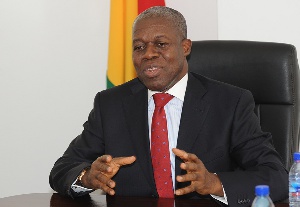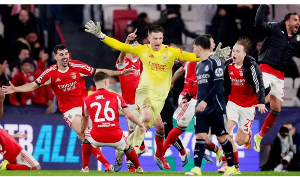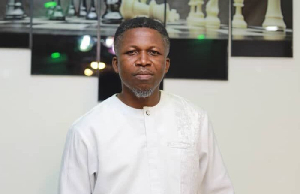Vice President Kwesi Amissah-Arthur on Wednesday said the economy was not broke, rather an exceptional fiscal situation last year created challenges.
He said the situation required measures to create stability and to pursue growth-enhancing programmes.
The fiscal challenges, he added, were transmitted onto the monetary sector this year (2013), and there was a decline in concessional financing.
At a meeting with the Governing Council of the Private Enterprise Foundation (PEF) in Accra, the Vice President said the government was, therefore, considering the use of tariffs and leveraging the private sector, to team up with government in delivering investment.
He cited the slow rate of investment in maintenance in the power sector at the Volta River Authority (VRA), and called for a change in attitude to tariff adjustment to attain the prospects of the economy.
The meeting was the third in a series that the PEF had had with the vice president this year to dialogue on critical issues of the Ghanaian economy.
The third one followed a memo from the PEF, suggesting among other things, a second look at Government’s upward adjustment of tariffs, which the PEF considers as not in the interest of business development and growth, in the face of the power crisis, high cost of credit and labour and other inputs.
The vice president gave a plus to the ability of some African nations, including Ghana, to do well despite their economic challenges, stating in the case of Ghana that “there is hope.”
“Every country has challenges, but what we decide to do should be the essence,” the vice president stated.
He said the low prices of Ghana’s commodities, cocoa and gold, had been low against a rather high cost of crude oil, with negative impact on the Ghanaian economy.
He made a case for an acceptance of the upward review of tariffs as an alternative to finance short prospects.
“If all taxes go back to that of last year’s levels, there is no future of the prospects of the economy,” the vice president said, and warned of serious consequences in delivering social investment in the next few years if the necessary measures were not taken now.
He assured the PEF that the government would increase its dialogue with the business community on measures being taken to plug out excesses in public spending, which the PEF complained as having a negative impact on private sector business.
Mr Asare Akuffo, President of the Council, commended the interaction between government and the PEF.
He said a number of business associations were joining the PEF, but added however, the level of confidence in Ghanaian business was not at the expected acceptable levels, and prayed government to help reverse the situation.
Nana Osei Bonsu, the Chief Executive Officer (CEO) of the PEF, however, described as unfair for the government to add to the burden of businesses, with what he called “big-big taxes” in the face of continuous power outages, high interests and reduced profit margins.
He complained there would be a negative effect on the competitiveness of Ghanaian businesses on the global stage, with the additional taxes in the recently re-introduced National Fiscal Stabilisation Levy.
A fortnight ago, Ghana’s Parliament approved the National Fiscal Stabilization Levy Bill and the Special Import Levy Bill to shore up revenues to bridge this year's budget deficit and raise funds for national development.
The National Fiscal Stabilization Levy would enable the government to generate revenues topping some GHc88 million to support shortfalls in this year's budget.
It has re-imposed a stabilisation levy of five per cent on profit before tax of selected companies and institutions for a period of 18 months to raise funds for fiscal stabilisation of the economy.
Government in 2009 introduced the National Fiscal Stabilisation Act, 2009 (Act 785), to garner resources for economic expansion.
However, following the stability of the economy in 2011, the Act was repealed, but due to the implementation of the Single Spine Salary Scheme among others threatening to crowd out investment in other sectors of the economy, the levy is being re-imposed to help generate revenue to meet those shortfalls.
The Special Import Levy Bill, on the other hand, forms part of measures taken by the government to increase revenue generation to support social services and infrastructure programmes outlined in the 2013 budget.
The Bill, which seeks to impose a special import levy on selected imported goods at the point of entry, is expected to yield revenues in the range of GHc208 million over the remaining six months of the year.
Goods to be levied under this provision include outboard motors, fishing nets, agricultural machinery, dairy milking products, energy saving bulbs, book binding machines, cutlasses and some farming inputs.
General News of Thursday, 18 July 2013
Source: GNA













